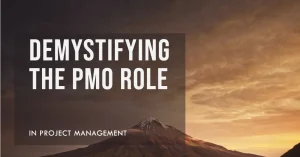To find out how Artificial Intelligence is changing the Project Management landscape, you may enjoy reading this article https://www.shaunstoltz.com/did-artificial-intelligence-just-change-everything-about-project-management/
I. Introduction
The world of project management has significantly transformed over the years, with many businesses adopting more flexible and collaborative approaches to achieving their goals. A prominent methodology that has emerged as a go-to strategy for many modern organizations is Agile, and within it, the Scrum framework stands out as an effective method of managing complex projects.
At the heart of Scrum, a Scrum Master plays a critical role, orchestrating the team’s moves, smoothing out challenges, and ensuring the principles of Scrum are adhered to meticulously. Whether you’re new to the concept of Scrum or a seasoned professional seeking to improve your understanding, the role of a Scrum Master is vital to comprehend. It can be likened to that of a conductor in an orchestra, where every player knows their part, but the harmonious outcome is largely due to the guidance of the maestro.
In this blog post, we will unravel the intricacies of the Scrum Master’s role, delineate its responsibilities, and discuss the key skills required to excel in this position. More importantly, we will explore how a Scrum Master contributes to the success of a Scrum team and a project at large. As we delve into these aspects, you will come to understand why a Scrum Master is not just a role but a state of mind dedicated to fostering collaboration, facilitating communication, and nurturing a productive work environment.
Join us as we embark on this enlightening journey to understand the role of a Scrum Master, a pivotal gear in the Scrum machinery that drives teams towards successful project outcomes. Let’s unveil the world of Scrum Masters!
II. What is a Scrum Master?
Understanding the Scrum Master role requires delving into the Scrum framework’s essence. Scrum, as a subset of Agile, operates under a set of defined principles and values that champion flexibility, adaptability, collaboration, and customer focus. While Scrum follows a simple set of roles, rules, and rituals, applying it effectively requires a unique role that has been coined as the ‘Scrum Master’.
So, who is a Scrum Master? A Scrum Master is a servant-leader, a guide, a facilitator, and a coach for a Scrum Team, helping them to implement and follow Scrum principles, practices, and rules. Their role isn’t that of a traditional project manager but is a more collaborative one, aimed at empowering, enabling, and shielding the team to ensure optimum performance and output.
Crucial to the Scrum framework, a Scrum Master navigates the delicate balance between ensuring adherence to Scrum rules and fostering an environment where creativity, innovation, and productivity flourish. They are the team’s advocate, the product owner’s ally, and the organization’s ambassador of Scrum, aiming to build a bridge between the conceptual world of Agile methodologies and the reality of daily project work.
Within the Scrum Team, the Scrum Master holds a pivotal position. A Scrum Team typically comprises three roles: the Product Owner, the Development Team, and the Scrum Master. While the Product Owner sets the vision of the product, and the Development Team brings that vision to life, the Scrum Master ensures that the process runs smoothly, acting as a glue that binds together the various pieces of the Scrum jigsaw puzzle.
In the coming sections, we will explore the multifaceted role of a Scrum Master, their responsibilities, key skills, and how they contribute to a Scrum team’s success. The world of Scrum is vast and complex, but with the right Scrum Master, it becomes a journey of success and continual improvement. Stay tuned as we delve further into the dynamic world of Scrum Masters.
III. The Role of a Scrum Master
A Scrum Master wears many hats, and their role is as diverse as it is crucial. They are the guiding light that steers the Scrum team towards the shores of project success, navigating through the various Scrum ceremonies and fostering a conducive environment for the team’s productivity and growth.
Scrum Ceremonies and the Scrum Master
The Scrum framework revolves around a series of well-defined events, often termed Scrum ceremonies. These ceremonies, including the Daily Stand-Up, Sprint Planning, Sprint Review, and Sprint Retrospective, form the rhythmic heartbeat of any Scrum project. The Scrum Master plays a pivotal role in each of these ceremonies.
In the Daily Stand-Up, a brief meeting where the team syncs on the previous day’s work and the current day’s plan, the Scrum Master ensures that the meeting is effective, timely, and focused. They steer discussions away from problem-solving and towards synchronization and planning, ensuring problems are noted for discussion at a more appropriate time.
During Sprint Planning, where the team decides on the scope of work to be done in the next sprint, the Scrum Master facilitates discussions, helps to clarify goals and scope, and ensures the team has a clear understanding of what success looks like for the upcoming sprint.
In the Sprint Review, the Scrum Master assists the team in presenting their work to stakeholders, ensuring the review is productive and constructive. They ensure that feedback received is positive and constructive, facilitating discussion on what went well and what needs improvement.
Finally, in the Sprint Retrospective, the Scrum Master becomes a facilitator of continuous improvement, encouraging the team to reflect on their processes, interactions, tools, and their definition of “Done.” They help the team identify areas for improvement and strategies to implement these changes in the next sprint.
The Scrum Master as Servant-Leader
A Scrum Master’s role extends beyond ceremonies. They act as servant-leaders for the Product Owner and the Development Team. They assist the Product Owner in managing the product backlog effectively, ensuring that it is well-defined, prioritized, and understood by everyone. For the Development Team, the Scrum Master ensures they have a conducive environment to work, free from external distractions, and equipped with everything they need to deliver high-quality outputs.
The Scrum Master as a Guardian of Transparency and Communication
Transparency and clear communication are the cornerstones of successful Scrum implementation. The Scrum Master guards these principles fiercely, ensuring all team members have a clear understanding of goals, processes, progress, and challenges. They foster a culture of open communication, where issues are discussed openly, and ideas are shared freely.
As we continue to unravel the Scrum Master’s world, it becomes apparent that their role is as multifaceted as a prism, with each face reflecting a crucial aspect of Scrum implementation. Their role doesn’t end here, though. In our next section, we will delve into the many responsibilities of a Scrum Master. Stay with us as we continue our exploration of this vital Scrum role.
IV. Responsibilities of a Scrum Master
The Scrum Master is more than just a role; it is a responsibility towards the team, the project, and the organization. While their role is indeed multifaceted, their responsibilities define the contours of their actions and decisions. So, let’s delve into some of the key responsibilities that a Scrum Master shoulders.
Ensuring Adherence to Scrum Principles
The Scrum Master’s foremost responsibility is to ensure that the team is following Scrum principles, rules, and practices. This includes helping the team understand the theory and philosophy behind Scrum, training them in Scrum practices, and ensuring these practices are implemented consistently. They ensure the team embraces Agile values like openness, respect, courage, focus, and commitment.
Facilitating Communication Among Team Members
The Scrum Master plays a pivotal role in facilitating communication within the team and with other stakeholders. They create an environment where open dialogue is encouraged, ensuring that team members communicate effectively, respect each other’s ideas, and work collaboratively towards a common goal.
Resolving Obstacles
A key responsibility of the Scrum Master is to identify and remove any obstacles that might be hindering the team’s progress. This could be anything from technical issues, organizational bureaucracy, personnel conflicts, or resource shortages. The Scrum Master not only identifies these issues but also finds a way to resolve them quickly and efficiently.
Shielding the Team from External Interferences
The Scrum Master serves as a protective shield for the team, insulating them from external distractions and interruptions that could impact their focus and productivity. This involves managing interactions between the team and external stakeholders and ensuring that the team can maintain its focus on the tasks at hand.
Ensuring Team Health and Dynamics
The Scrum Master is responsible for ensuring a positive, productive, and healthy team environment. They foster a culture of mutual respect and trust, promote effective teamwork, and address any interpersonal issues that could disrupt the team’s harmony.
It’s clear from the list of responsibilities that the Scrum Master is not a traditional manager but a facilitator and an enabler. They work not to control but to empower, not to dictate but to guide. Their goal is to build a self-organizing team that can navigate the path of the project with minimal guidance and maximum efficiency.
In our next section, we will look at some of the key skills a Scrum Master needs to fulfill these responsibilities effectively. Stay tuned as we continue our journey into the world of Scrum Masters.
V. Key Skills of a Scrum Master
The Scrum Master role requires a unique skill set, combining a deep understanding of Scrum and Agile methodologies, superb communication skills, and an ability to solve problems and adapt quickly. Let’s explore these skills in more detail to better understand what it takes to excel as a Scrum Master.
Understanding of Scrum and Agile Methodologies
A deep, functional understanding of Scrum and Agile methodologies is essential for a Scrum Master. This means not only understanding the principles, values, roles, events, and artifacts of Scrum but also how to apply them in various scenarios. A Scrum Master should be able to train, coach, and guide the team in Scrum practices, and ensure these practices are followed consistently.
Excellent Communication and Leadership Skills
As the team’s facilitator and guide, a Scrum Master needs excellent communication and leadership skills. They should be able to articulate thoughts and ideas effectively, listen and understand others’ points of view, and facilitate productive communication within the team and with external stakeholders. As leaders, they should be able to inspire, motivate, and guide the team towards achieving their goals.
Problem-Solving Skills
A Scrum Master needs to be adept at identifying and solving problems. This could be anything from technical issues, organizational roadblocks, personnel conflicts, or process inefficiencies. A Scrum Master should be able to analyze problems, identify root causes, and devise effective solutions.
Flexibility and Adaptability
Scrum is all about flexibility and adaptability, and a Scrum Master needs to embody these values. They should be able to adapt to changing circumstances, adjust plans and strategies as needed, and help the team navigate through change without losing focus or productivity.
Mastery in Conflict Resolution and Negotiation
Conflicts are part and parcel of any team-based work. A Scrum Master should be able to handle conflicts in a positive and constructive manner, encouraging open dialogue, understanding different perspectives, and facilitating a resolution that is acceptable to all parties. They should also be skilled at negotiation, balancing different interests, and finding a common ground.
These skills form the bedrock of a Scrum Master’s capabilities, enabling them to fulfill their role and responsibilities effectively. But having these skills is not enough; a Scrum Master needs to know how to apply these skills to contribute to the success of a Scrum team and a project. In our next section, we will explore how a Scrum Master contributes to the success of a Scrum team and project. Stay with us as we continue to unveil the exciting world of Scrum Masters.
VI. How a Scrum Master Contributes to the Success of a Scrum Team and Project
We’ve explored the role, responsibilities, and key skills of a Scrum Master. Now let’s tie it all together and explore how a Scrum Master contributes to the overall success of a Scrum Team and project.
Ensuring Smooth Execution of Sprints
The Scrum Master plays a vital role in each sprint’s smooth execution, right from sprint planning to review and retrospective. They ensure that the team understands the sprint goals, works collaboratively and effectively, and adheres to Scrum practices throughout the sprint. They also help the team inspect and adapt their processes and methods, fostering a culture of continuous improvement.
Facilitating Communication and Collaboration
Effective communication and collaboration are key to a successful Scrum team, and the Scrum Master is the lynchpin that holds this together. They foster an environment where open dialogue is encouraged, ensuring that team members communicate effectively, resolve conflicts constructively, and work collaboratively towards a common goal.
Enhancing the Productivity of the Team
The Scrum Master helps enhance the team’s productivity by removing obstacles that might be hindering their progress, protecting the team from external distractions, and ensuring they have a conducive environment to work. They also help the team optimize their methods and processes, improving efficiency and productivity.
Creating a Conducive Environment for Creativity and Innovation
One of the key advantages of Scrum is its ability to foster creativity and innovation, and the Scrum Master plays a critical role in this. They create a safe and trusting environment where new ideas are encouraged, failures are seen as opportunities for learning, and innovation is celebrated.
Ensuring Product Delivery within Timelines and Budget
By ensuring smooth execution of sprints, facilitating communication and collaboration, enhancing productivity, and fostering creativity and innovation, the Scrum Master contributes to the successful delivery of the product within the stipulated timelines and budget.
The Scrum Master’s contribution goes beyond these tangible outcomes. They bring a sense of purpose and unity to the team, inspire them to achieve their best, and help them navigate through the complexities of the project with confidence and resilience.
In the following section, we’ll explore the pathway towards becoming a Scrum Master – the qualifications and certifications needed, the experience and skills necessary, and the continued learning and growth in the field. As we further delve into the world of Scrum Masters, it’s important to remember that being a Scrum Master is not just about doing a job, but about embodying a mindset – a mindset of servant leadership, continuous improvement, and unwavering commitment to the success of the team and the project.
VII. Becoming a Scrum Master: The Pathway
After understanding the profound impact a Scrum Master has on a Scrum Team and a project, you might be curious about the pathway to becoming a Scrum Master. This journey involves acquiring specific qualifications and certifications, building relevant experience, and constantly learning and adapting in a dynamic field.
Qualifications and Certifications
While there’s no strict requirement for formal education in becoming a Scrum Master, having a degree in computer science, business, or a related field is often beneficial. However, the most crucial credential for a Scrum Master is a Scrum certification. There are several recognized Scrum Master certifications, such as the Certified ScrumMaster (CSM) from Scrum Alliance, Professional Scrum Master (PSM) from Scrum.org, and the Advanced Certified ScrumMaster (A-CSM) from Scrum Alliance. These certifications demonstrate your understanding of Scrum principles, practices, and skills, making you a viable candidate for Scrum Master roles.
Relevant Experience
Experience in a Scrum environment is often a prerequisite for becoming a Scrum Master. This could be in the form of being a part of a Scrum Team as a developer, product owner, or in another capacity. Such experience helps you understand the nuances of a Scrum Team, the challenges they face, and how Scrum principles and practices are applied in a real-world context.
Building Essential Skills
As discussed earlier, a Scrum Master needs to have a unique skill set, including an understanding of Scrum and Agile methodologies, excellent communication and leadership skills, problem-solving skills, and the ability to adapt and be flexible. These skills can be developed through hands-on experience, learning resources, and mentorship.
Continuous Learning and Growth
The world of Scrum and Agile methodologies is dynamic and evolving. A Scrum Master needs to be committed to continuous learning and growth, staying updated with the latest developments in the field, and constantly refining their skills and knowledge. This could be through attending seminars and workshops, participating in Scrum and Agile communities, reading books and articles, or pursuing advanced certifications.
The journey to becoming a Scrum Master is a journey of learning, experience, and growth. It’s about adopting a new mindset and developing a unique set of skills. But most importantly, it’s about becoming a servant-leader, empowering your team to reach new heights of success and excellence.
VIII. Conclusion
Embarking on a journey as a Scrum Master is not a decision to be taken lightly, but it is indeed a rewarding one. The Scrum Master role is unique, multifaceted, and critical to the success of any Scrum team and project. As the heartbeat of the team, a Scrum Master ensures smooth implementation of Scrum practices, fosters an environment conducive to productivity and growth, and stands as the team’s facilitator and guide.
But becoming a Scrum Master involves more than just understanding Scrum principles and acquiring certifications. It’s about developing essential skills such as effective communication, problem-solving, adaptability, and conflict resolution. Moreover, it’s about embracing a mindset of servant leadership and continuous learning.
Despite the challenges that lie along the path, the rewards of being a Scrum Master are many. From the joy of seeing a project succeed to the satisfaction of seeing your team grow and excel, the Scrum Master role is indeed a fulfilling one.
As we close this in-depth exploration of the Scrum Master role, we hope that you’ve gained a deeper understanding and appreciation of what it means to be a Scrum Master. The Scrum Master is more than a role – it’s a calling, a commitment, and a mission to help teams achieve their best. If you are inspired by this mission, then perhaps the path of the Scrum Master awaits you.
Thank you for joining us on this journey into the world of Scrum Masters. We hope this comprehensive guide has been enlightening and useful. As always, we’d love to hear your thoughts and feedback. Feel free to leave comments or reach out to us. Until next time, happy Scrumming!
Find out more about Shaun Stoltz https://www.shaunstoltz.com/about/
This post was written by an AI and reviewed/edited by a human.



